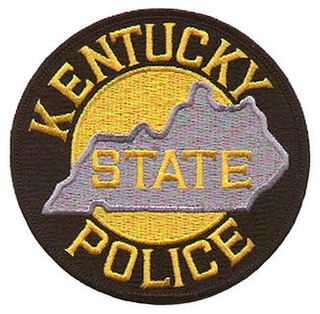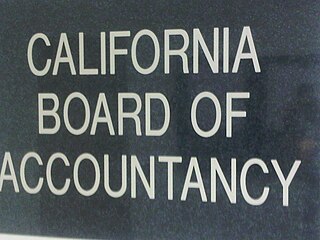Related Research Articles

Certified Public Accountant (CPA) is the title of qualified accountants in numerous countries in the English-speaking world. It is generally equivalent to the title of chartered accountant in other English-speaking countries. In the United States, the CPA is a license to provide accounting services to the public. It is awarded by each of the 50 states for practice in that state. Additionally, all states except Hawaii have passed mobility laws to allow CPAs from other states to practice in their state. State licensing requirements vary, but the minimum standard requirements include passing the Uniform Certified Public Accountant Examination, 150 semester units of college education, and one year of accounting-related experience.

A law enforcement officer (LEO), or peace officer in North American English, is a public-sector or private-sector employee whose duties primarily involve the enforcement of laws, protecting life & property, keeping the peace, and other public safety related duties. Law enforcement officers are designated certain powers & authority by law to allow them to carry out their responsibilities.

A police academy, also known as a law enforcement training center, police college, or police university, is a training school for police cadets, designed to prepare them for the law enforcement agency they will be joining upon graduation, or to otherwise certify an individual as a law enforcement officer, typically a police officer.

The Alaska State Troopers, officially the Division of Alaska State Troopers (AST), is the state police agency of the U.S. state of Alaska. It is a division of the Alaska Department of Public Safety (DPS). The AST is a full-service law enforcement agency that handles both traffic and criminal law enforcement. The AST is also involved in apprehending fugitives as part of the Alaska Fugitive Task Force, an inter-agency collaborative of Alaska police departments that cooperates with police agencies throughout the United States and less commonly with Interpol in apprehending wanted men and women. Unlike many lower 48 states, the AST also serves as Alaska’s primary environmental law enforcement agency; troopers assigned to the AST’s Division of Alaska Wildlife Troopers are known as "Alaska Wildlife Troopers" and primarily serve as game wardens, although they retain the same powers as other Alaskan state troopers.
Erwin Ballarta is the executive director of the Texas Police Association, a 501(c)(3) association founded in 1895 with the main purpose of promoting professionalism in law enforcement. Ballarta was previously the Executive Vice President of Capitol Strategic Operations He is a self-defense expert in Pekiti Tirsia Kali and various weapons. Ballarta has taught hand-to-hand combat and weapon tactics to the FBI, the Texas Highway patrol, and various military personnel and has been a bodyguard of George W. Bush and various celebrities. He was a Lieutenant with the Texas Department of Public Safety (DPS), where he was the Recruit School Coordinator and Defensive Tactics Coordinator for the Training Academy. He retired from the Texas D.P.S. at the end of August, 2008. He is also president of the Austin Filipino American Association and the executive director of the Texas Kali Association.
Carl Wunsche Sr. High School is a career academy high school in unincorporated Harris County, Texas. Wunsche is in the Spring Independent School District and serves grades 9 through 12. Students who currently attend Dekaney High School, Spring High School and Westfield High School are allowed to attend Wunsche. As of 2017, about 850 students attend the school. The first official class of Wunsche graduated in 2019.

The Colorado Rangers Law Enforcement Shared Reserve (CLER), known publicly as the Colorado Rangers, is a statewide police agency in the U.S. state of Colorado. It is a statewide law enforcement reserve of sworn POST-certified peace officers who serve as force multipliers, allowing Colorado law enforcement agencies to reduce costs and manpower through a shared force. It is the only such statewide police reserve force in the United States. The Colorado Rangers have existed in some capacity since Colorado Territory's formation in 1861, though the modern agency was formed in 2017 from the Colorado Mounted Rangers.

The Kentucky State Police (KSP) is a department of the Kentucky Justice and Public Safety Cabinet, and the official State Police force of the Commonwealth of Kentucky, responsible for statewide law enforcement. The department was founded in 1948 and replaced the Kentucky Highway Patrol. The department's sworn personnel hold the title State Trooper, and its nickname is The Thin Gray Line.

Cypress Creek Emergency Medical ServicesAssociation, also known as Cypress Creek EMS (CCEMS) was a private, non-profit emergency medical service provider for Harris County ESD 11 in North Harris County, within greater Houston, Texas. In 2021, CCEMS declared bankruptcy and operations ceased in mid 2022. In late 2022, the remaining assets, branding, and trademarks were bought by Viking Enterprises, DBA City Ambulance Service. All ambulances in use by CCEMS are Mobile Intensive Care Units (MICU), with at least one Paramedic, making all ambulances ALS units. Cypress Creek EMS provided 911 service in North Harris County, provided bicycle medic teams for special events, provided tactical EMS support for federal, state, and local law enforcement, and operated an accredited educational institution.
In the U.S. state of Texas, a constable is an elected law enforcement officer for a precinct of a county. Counties may have between one and eight precincts each depending on their population.
Association of Public-Safety Communications Officials (APCO) International was founded in 1935.

In the United States, a sheriff is the chief of law enforcement of a county. Sheriffs are usually either elected by the populace or appointed by an elected body.

A security guard is a person employed by a government or private party to protect the employing party's assets from a variety of hazards by enforcing preventative measures. Security guards do this by maintaining a high-visibility presence to deter illegal and inappropriate actions, looking for signs of crime or other hazards, taking action to minimize damage, and reporting any incidents to their clients and emergency services, as appropriate.

The California Board of Accountancy (CBA), created by statute in 1901, is a semi-autonomous State of California agency under the California Department of Consumer Affairs whose purpose is to protect consumers by ensuring only qualified licensees practice public accountancy in accordance with established professional standards in California.
In South Carolina, a State Constable is a law enforcement officer who is either a uniformed or plainclothes law enforcement officer employed by one of the departments of the state government, a retired police officer, or a volunteer reserve police officer. Officers may be variously described as "State Constable", "Special State Constable", "Department of Public Safety (DPS) Special Constable" and "Magistrates' Constable". State Constables are appointed by the Governor of South Carolina, and regulated by the South Carolina Law Enforcement Division.
In the United States, certification and licensure requirements for law enforcement officers vary significantly from state to state. Policing in the United States is highly fragmented, and there are no national minimum standards for licensing police officers in the U.S. Researchers say police are given far more training on use of firearms than on de-escalating provocative situations. On average, US officers spend around 21 weeks training before they are qualified to go on patrol, which is far less than in most other developed countries.
William H. Adcox is the Chief Security Officer for the University of Texas MD Anderson Cancer Center and a pioneer of Threat Safety Science in healthcare. He is also the Chief of Police and Chief Security Officer at the University of Texas at Houston Police Department, which is a component of the University of Texas System. He has had a longstanding career as a police officer and Deputy Chief of Police in El Paso, Texas.
Inspector Vicki King is a pioneering threat safety scientist in the healthcare sector. She is the leader of the Threat Assessment Unit at the University of Texas at Houston Police Department, which is a component of the University of Texas System.
In the United States, there is no consistent use of the office of constable throughout the states; use may vary within a state. A constable may be an official responsible for service of process: such as summonses and subpoenas for people to appear in court in criminal and/or civil matters. They can also be fully empowered law enforcement officers. Constables may have additional specialized duties unique to the office. In some states the constable is an elected or appointed position at the state or local level of local government. Their jurisdiction can vary from statewide to county/parish and local township boundaries based on the state's laws.
The Minnesota Board of Peace Officer Standards and Training (POST) is an administrative body of the State of Minnesota that sets regulations and controls the training and licensing of police officers. The Minnesota legislature replaced the Minnesota Peace Officer Training Board (MPOTB) with POST in 1977. Minnesota was the first U.S. state to introduce an occupational licensing system for law enforcement officers. The POST Executive Director reports to the board's 15 members which include 10 law enforcement officers, two educators and two members of the public, all appointed by the governor, plus the superintendent of the state Bureau of Criminal Apprehension, who serves ex officio.
References
- ↑ "TCLEOSE - Texas Commission on Law Enforcement". Archived from the original on 2014-01-22. Retrieved 2012-01-31.
- ↑ "Occupations Code Chapter 1701. Law Enforcement Officers".
- ↑ "TCLEOSE - Texas Commission on Law Enforcement Officers Standards and Education". Archived from the original on 2012-02-19. Retrieved 2012-01-31.
- ↑ "Archived copy" (PDF). Archived from the original (PDF) on 2012-02-20. Retrieved 2012-01-31.
{{cite web}}: CS1 maint: archived copy as title (link) - ↑ "TCLEOSE - Texas Commission on Law Enforcement Officers Standards and Education". Archived from the original on 2012-02-19. Retrieved 2012-01-31.
- ↑ "Archived copy". Archived from the original on 2011-12-07. Retrieved 2012-01-31.
{{cite web}}: CS1 maint: archived copy as title (link) - ↑ "Archived copy". Archived from the original on 2012-02-20. Retrieved 2012-01-31.
{{cite web}}: CS1 maint: archived copy as title (link) - ↑ "TCLEOSE - Texas Commission on Law Enforcement Officers Standards and Education". Archived from the original on 2012-02-20. Retrieved 2012-01-30.
- ↑ "Home". texaspeaceofficersmemorial.org.
- ↑ "TCLEOSE - Texas Commission on Law Enforcement Officers Standards and Education". Archived from the original on 2012-02-19. Retrieved 2012-01-31.